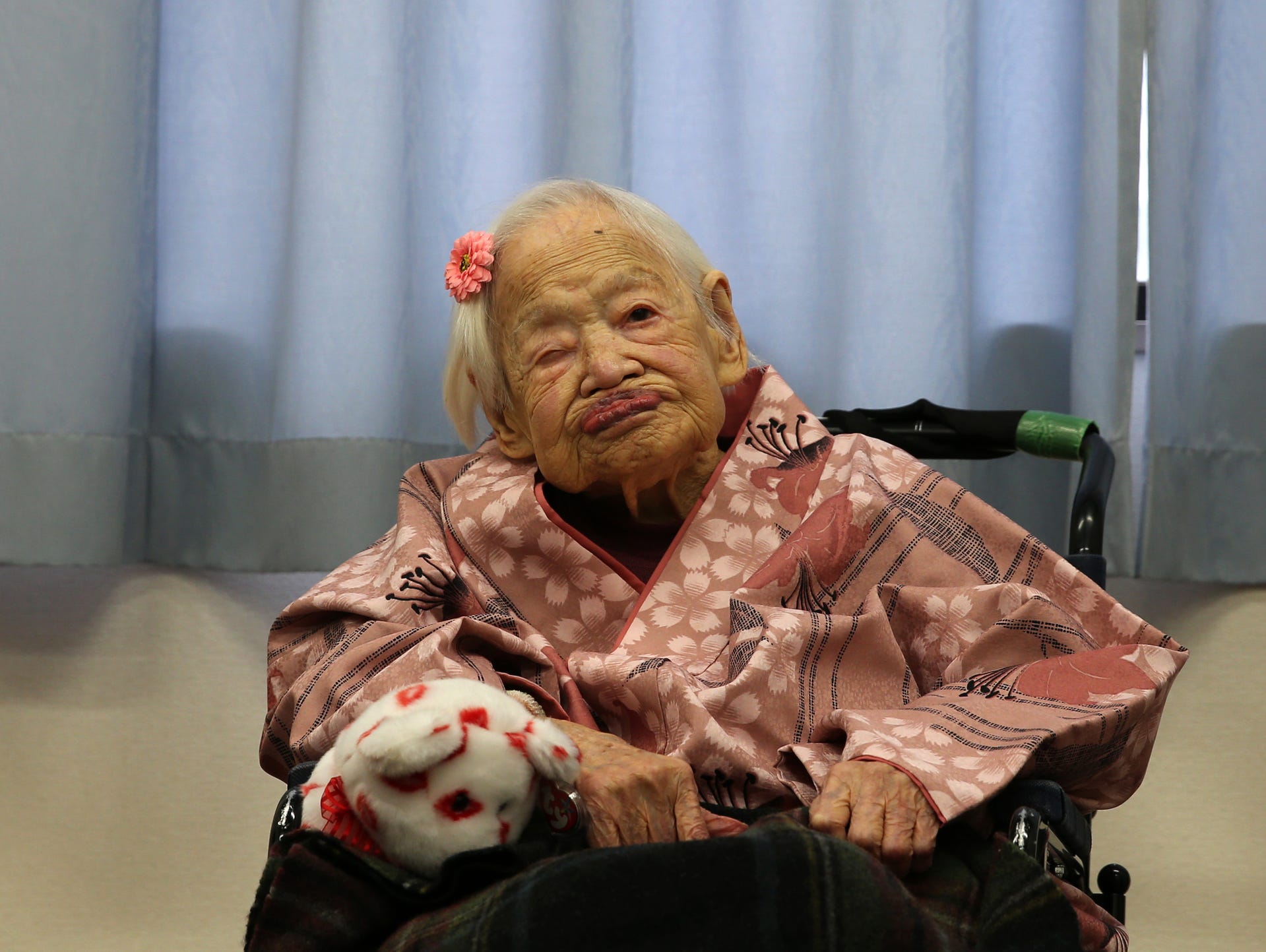Misao Okawa of Japan, the world's oldest living person, is turning 117 years old. Mike Janela (@mikejanela) looks at her secrets for long life. Video provided by Buzz60 Newslook
TOKYO — So what does Misao Okawa, the world's oldest person, think about her long life as she turned 117 on Thursday?
"It seemed rather short," she said, according to the Associated Press, at a family celebration Wednesday at the nursing home in Osaka where she lives.
Okawa might be forgiven for a somewhat blasé attitude. After all, Japan has more than 58,000 people who are least 100 years old — nearly 90% of them women. That's more than any other country.
But age is no joking matter here. Increasing life expectancy and a plummeting birth rate mean that Japan's population is getting older fast, with potentially severe social and economic consequences.
Already, a quarter of Japan's population of about 127 million is 65 years or older, according to the Ministry of Health, Labor and Welfare.
That will grow to one-third by 2025 when Baby Boomers begin turning 75. Elderly people living alone or as a couple will account for 30% of all households in Japan by 2015, and the number of persons with dementia will increase from 2.8 million to 4.7 million, according to the ministry.
"One of the frightening things about demographic crises is that by the time people see them coming, there is little they can do to prevent them," Kenji Shimazaki, a health care and population specialist at the National Graduate Institute for Policy Studies in Tokyo, wrote in a 2012 study.
"Japanese society in 50 years will be in many ways fundamentally different from the society we have known to this point," he wrote.
The "hyper-aging" crisis is due in part to improved diet and health care that have boosted longevity. Average life expectancy for Japanese men rose from 65.3 years in 1960 to 80 in 2013. For women, life expectancy grew from 70.2 to 86.4 years — the longest in the world.
That's especially evident in Okawa's age bracket. The total number of Japanese at least 100 years old has soared from just 153 in 1963 to 58,820. The oldest male in the world is also Japanese — 111-year-old Sakari Momoi.
In the United States, there were about 55,000 Americans 100 years or older in 2011 — just 0.02% of a population that's double that of Japan, according to the U.S. Census Bureau. About 13% of the U.S. population is 65 or older, according to the bureau.
Longer life is generally a good thing. But Japan's birth rate has been dropping steadily, even as people are living longer. The result is that Japan's population is getting smaller even as it gets older.
Japan's population peaked in 2004 at nearly 128 million. According to Japan's National Institute of Population and Social Security Research, the population will drop to 117 million by 2030 and 87 million by 2060.
One consequence is that fewer workers will have to support more elderly and retirees.
In 1985, for example, there were seven people of working age for each elderly person. By 2010, that number dropped to 2.8 and will fall to 1.7 by 2060, according to Shimazaki's study.
As the percentage of elderly persons grows, so will the percentage of elderly voters, with consequent changes in political influence.
According to Shimazaki, 46% of all voters in Japan will be at least 65 by 2060.
"As senior citizens gain electoral clout, the government will find it increasingly difficult to adopt policies that work to their disadvantage. It will be more inclined than ever to 'kick the can down the road' when it comes to such cost-saving measures as reducing benefits and raising medical co-pays," he warned.
Government officials are taking steps to adapt. The mandatory retirement age has been pushed back to 65 and the Abe administration is looking to add tens of thousands of day-care centers to encourage women to have more children and remain in the workforce longer.
In Tokyo, the metropolitan government is doubling the capacity of serviced apartments for the elderly, care facilities for elderly people with severe disabilities and group homes for elderly dementia sufferers.
But age does not necessarily mean infirmity.
Hiroko Akiyama, a professor of gerontology at the University of Tokyo, said Thursday that the elderly in Japan are remaining healthier longer, and are increasingly willing to stay in the workforce.
According to a survey by Ministry of Internal Affairs and Communications, one out of four elderly people in Japan continue to work, mostly part time.
"About 80% of Japanese elderly are disability-free at 75 years old, and our goal is to push that to 80 years," Akiyama said. "The key is not just to live longer, but to live happy, healthy and productive lives."
Okawa might appreciate that. She was recognized as the world's oldest person by Guinness World Records in 2013. Although she lives in a care home, she was able to walk without assistance until just a few years ago, and is able to move about in a wheelchair on her own.
When asked how she had managed to live so long, she replied, "I wonder about that too," according to the AP.

No comments:
Post a Comment
Please leave a comment-- or suggestions, particularly of topics and places you'd like to see covered